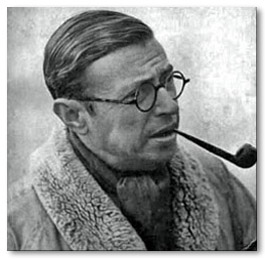Let me start by saying that I do not know what is meant by the ‘ambiguity of the human condition’. I have reason to think, however, that it is something that one should at least think about. Simone de Beauvoir claims that at one point or another every human being will of necessity feel the ambiguity of his existence. So here are the two things I would like to consider: first, what is the ambiguity of the human condition; and second, how does this ambiguity affect me as a person, if it has any effect at all.
Simone de Beauvoir, like Sartre, is an existentialist. Sartre and De Beauvoir had a professional relationship, as well as, a romantic one (they were partners). De Beauvoir agrees with Sartre on many points and, in fact, completes his work on different occasions. De Beauvoir expands on Sartre’s idea of ‘anxiety’. Sartre claims that humans feel anxious because ‘existence precedes essence’. Human beings simply find that they exist; and it is up to them to give meaning to their lives. Humans are not like calculators that come with manuals stating their functions. Humans have to create a manual for their lives. This is a huge responsibility that humans have to face, and it no doubt makes them anxious.
The fact that the human ‘existence precedes essence’ partially explains why the human existence is ambiguous, according to De Beauvoir. Simply, put humans just find that they exist; their existence is “pure contingency” (De Beauvoir 15). “There is no more reason to exist than not to exist” (De Beauvoir 15).
In addition to the fact that human existence is pure contingency, humans are faced with the problem of being neither fully mind nor matter. This lack of synthesis between the physical aspect of humans, and the mental aspect is disconcerting for humans. Only God, De Beauvoir claims, is unified in this way (De Beauvoir 10). Humans, as pure rationality, view themselves as masters of everything around them (De Beauvoir 9). Humans in fact master the world through their actions. Machines such as airplanes, cars, buildings, and even simple objects like rakes, show how humans, through intellect, have subjected the world around them to humans use.
But that is not the end of the story. In order to make appliances, humans need their body. But the human body is not indestructible. Natural objects like fire, and ice, and the very objects that humans have created can harm the body. Death is the finality of humans, and humans cannot escape their death. Therefore, even though human rationality seeks to place humans above all else around them, human physicality links humans to the rest of nature and there lies the inability of humans to truly master the world.
Therefore, not only can humans not achieve a synthesis of their mind and body; they are faced with the responsibility of giving meaning to their existence. I can see how this situation will be disconcerting for any human being. I have wondered myself the meaning of “all this”. Why do I exist? Why is there a world at all? And like Heidegger, I have asked, “why is there something rather than nothing?” I fail to see however why existentialists take these questions so seriously. Heidegger believes that the question, “why is there something rather than nothing?” should be the first philosophical question. De Beauvoir believes that it is dubious to try to ignore this ambiguity.
Even if it were true that every human feels the ambiguity of his existence at one point or the other, why must he or she take cognizance of it? My point is this, when humans come to the world, they have the world already defined for them. They can follow in the foot – steps of their parents and others. So, why should humans bother with this situation? It seems that the ambiguity of the human condition is something that as a person you encounter at some point in your life, realize you have no answers to your “whys”, and you simply move on. In fact, you have to move on.
I am also weary of De Beauvoir’s claim that humans view themselves as the masters of everything around them. I know that will be unfair to say now, after the fact, that humans do not view themselves as masters of everything around them, as humans are clearly are not. But, is it really true that all humans think of humanity as superior in that sense? Different cultures see humanity in different ways. I think that cultural insensitivity might contribute to De Beauvoir’s claim that humans view themselves as the “supreme end to which all action should be subordinated” (De Beauvoir 9). Some cultural groups worship nature, for example. It will be incoherent for a group of people who view nature as being worthy of their worship, to at the same time view nature as being subject to them.
I understand that at first it is disconcerting when you realize the lack of explanation that is your existence, but you move on. Simple. I am just finding it hard to understand why this ambiguity of the human condition is something we should dwell on. De Beauvoir has reason to believe that one should consider this ambiguity seriously, because as she claims, there are better or worse ways to cope with it. It is on this basis she develops an “ethics of ambiguity”. I will not discuss that here.
Works Cited
De Beauvoir, Simone, The Ethics of Ambiguity, Citadel Press, 1976

